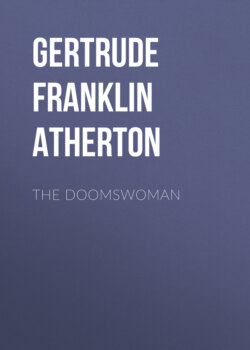Читать книгу The Doomswoman - Gertrude Franklin Horn Atherton - Страница 7
На сайте Литреса книга снята с продажи.
V.
ОглавлениеTable of Contents
I went upstairs and found Chonita reading Landor's "Imaginary Conversations." (When Chonita was eighteen—she was now twenty-four—Don Alfredo Robinson, one of the American residents, had at her father's request sent to Boston for a library of several hundred books, a birthday gift for the ambitious daughter of the Iturbi y Moncadas. The selection was an admirable one, and a rancho would not have pleased her as well. She read English and French with ease, although she spoke both languages brokenly.) As I entered she laid down the book and clasped her hands behind her head. She looked tranquil, but less amiable than was her wont.
"Thou hast been far away from the caballeros and the doñas of
Monterey," I said.
"Not even among Spanish ghosts."
"I think thou carest at heart for nothing but thy books."
"And a few people, and my religion."
"But they come second, although thou wilt not acknowledge it even to thyself. Suppose thou hadst to sacrifice thy religion or thy books, never to read another? Which wouldst thou choose?"
"God of my soul! what a question! No Spanish woman was ever a truer Catholic; but to read is my happiness, the only happiness I want on earth."
"Art thou sure that to train the intellect means happiness?"
"Sure. Does it not give us the power to abstract ourselves from life when we are tired of it?"
"True, but there is another result you have not thought of. The more the intellect is developed, the more acute and aggressive is the nervous system; the more tenacious is the memory, the more has one to live with, and the higher the ideals. When the time comes for you to live you will suffer with double the intensity and depth of the woman whose nerves are dull or stunted."
"To suffer you must love, and I never shall love. Who is there to love? Books always suffice me, and I suppose there are enough in the world to make the time pass as long as I live."
I did not continue the argument, knowing the placid superiority of inexperience.
"But thou hast not yet told me which thou wouldst give up."
"The books, of course. I hope I know my duty. I would sacrifice all things to my religion. But the priests do not interfere now as they did in the last generation."
I was very religious in those days, and my heart beat with approval. "I have always said that the Church may let women read what they choose. The good principles they are born with they will adhere to."
"We are by nature conservatives, that is all. And we have need of religion. We must have something to lean on, and men are poor props, as far as I have observed. Sometimes after having read a long while in an absorbing book, particularly one that seemed to put something with a living hand into my brain and make it feel larger, I find that I am miles away from the Church; I have forgotten its existence. I always run back."
"Dios! I should think so. Yes, it is well we do need our religion. Men do not; for that reason they drop it the moment the wings on their minds grow fast—as they would, when the warm sun came out, drop the thick blanket of the Indian, borrowed and gratefully worn in dark uncertain weather. I do not dare ask Diego Estenega what he believes, lest he tell me he believes nothing and I should have to hear it. How dost thou like my friend, Chonita?"
"Art thou asking me how I like the enemy of my house? I hate him."
"If he goes to Santa Barbara with Alvarado this summer wilt thou ask him to be thy guest?"
"Of course. The enmity has always been veiled with much courtesy; and
I would have him see that we know how to entertain."
I watched her covertly; I could detect no sign of interest. Presently she took up the volume of Landor and read aloud to me, the stately English sounding oddly with her Spanish accent.
